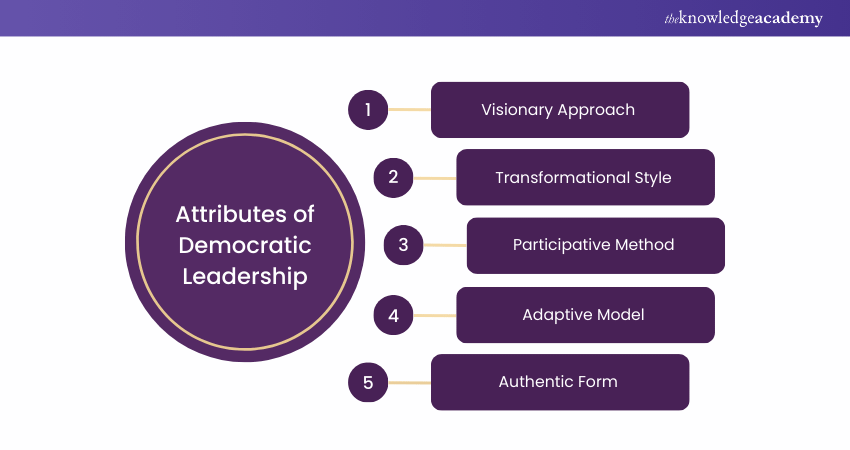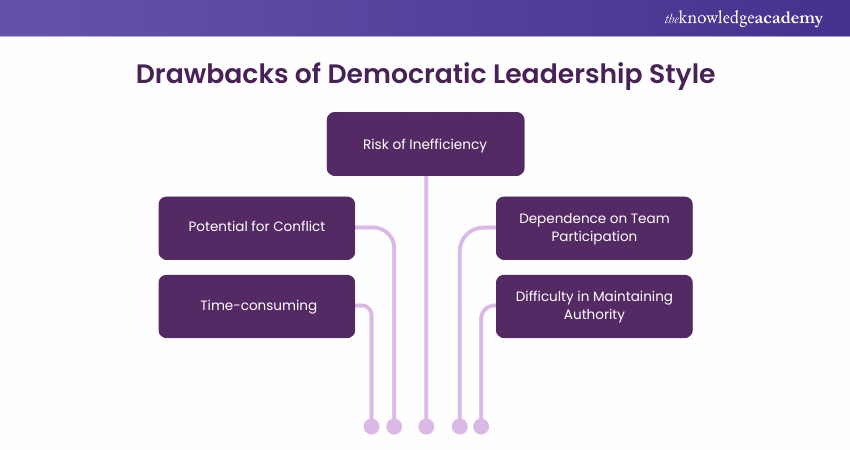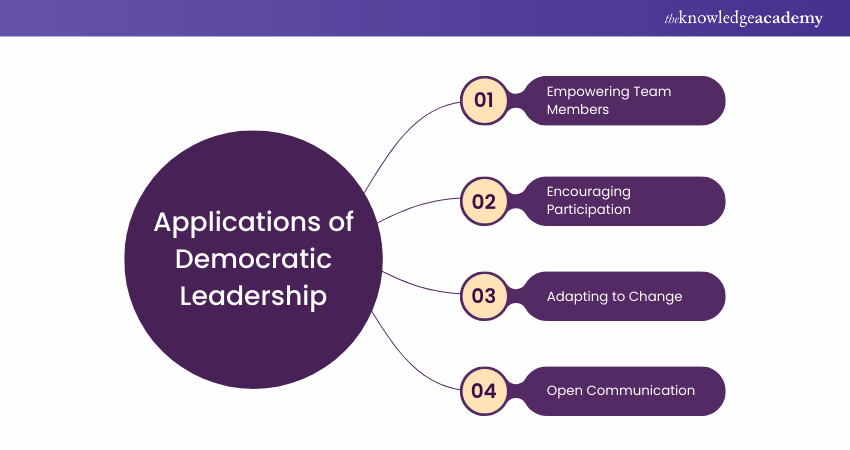We may not have the course you’re looking for. If you enquire or give us a call on +30 2111995372 and speak to our training experts, we may still be able to help with your training requirements.
Training Outcomes Within Your Budget!
We ensure quality, budget-alignment, and timely delivery by our expert instructors.

When talking about Leadership, you might picture it as a person, bossing over the masses in a rather comical manner. Much like Sacha Baron Cohen in The Dictator. What if someone told you, there is a form of leadership that took into account the input of the masses when it comes to making the decisions that affects them? If this was an episode of Jeopardy, the answer to this question would be “What is Democratic Leadership?”.
Among the many forms of Leadership, one that truly stands out for its uniqueness is Democratic Leadership. In this blog, we will talk about its characteristics, advantages, and disadvantages. By examining both the benefits and the challenges, you can decide if this leadership style aligns with your team’s needs. Let’s dive in to know more!
Table of Contents
1) What is Democratic Leadership Style?
2) Characteristics of Democratic Leadership
3) Benefits of Using Democratic Leadership
4) Challenges of the Democratic Leadership Style
5) How to Apply Democratic Leadership?
6) Example of Democratic Leadership
7) Conclusion
What is Democratic Leadership Style?
The term democracy signifies “governed by the people.” This leadership style involves allowing multiple individuals to engage in the decision-making process, ensuring a broad range of perspectives are considered. Democratic Leadership, also recognised as participative leadership, is characterised by its inclusive approach. Many of the world’s most democratic leaders are either heads of state or leaders of major corporations. These leaders understand the value of collective input and strive to create an environment where every team member’s voice is heard.
By seeking input from all team members, democratic leaders make decisions that reflect the collective will, much like voting on governmental policies. This approach not only fosters a sense of ownership and accountability among team members but also leads to more well-rounded and effective decision-making. In essence, Democratic Leadership is about harnessing the power of collective wisdom to guide and shape the direction of an organisation or nation.
Characteristics of Democratic Leadership
There are numerous leadership styles, each differing significantly from the others. The Democratic Leadership style is particularly effective for those who wish to involve their team in problem-solving and decision-making processes. Let’s examine its characteristics:

Visionary Approach
Visionary Democratic Leaders inspire and motivate their followers with a clear and compelling future vision. They communicate their vision effectively and persuasively and align the group’s actions and values with the vision.
They also empower their followers to pursue the vision independently and creatively while providing guidance and support when needed.
Transformational Style
As the name suggests, this form of leadership aims to transform a group of people. It does so by posing a common issue to stimulate and challenge the followers to achieve higher performance and potential. They appeal to the followers’ intrinsic motivation, values, and ideals and foster a sense of purpose, commitment, and loyalty.
This form of leadership is great for build team moral as it creates a positive and supportive environment. With a leadership like this, the people recognise their leader’s efforts to build something better for his people. This helps keep the people cared for and happy.
Participative Method
Participative Democratic Leaders involve their followers in every aspect of the decision-making process. They solicit and consider the input and suggestions of the followers, and they delegate authority and responsibility to them.
They also share information and resources with their followers, encouraging collaboration and teamwork.
Adaptive Model
Adaptive Democratic Leaders adjust their Leadership style and behaviour according to the changing needs and demands of the situation. They are flexible and responsive to the feedback and signals from the followers, the environment, and the task.
They also enable their followers to adapt and cope with the changes and provide them with the necessary resources and support.
Authentic Form
Authentic Democratic Leaders are genuine and transparent in their Leadership. They are all about showing their true self and what they believe in. They do not wish to pretend or manipulate their masses. They also respect and appreciate their followers' authenticity and encourage them to express their true selves, values, and beliefs. Even if it is critical of the leadership.
This helps establish and maintain high trust and integrity with the people. It also makes sure they are free to voice their opinions by modelling the behaviour they wish to see in their people.
Transform your ability to inspire and lead with confidence – sign up for our Leadership Skills Training now!
Benefits of Using Democratic Leadership
Democratic Leadership offers numerous advantages to teams. Here are a few of those benefits:
a) Wide Range of Ideas: Democratic leaders can foster brainstorming sessions, gathering a broad spectrum of ideas from team members. This approach can lead to innovation, unique problem-solving methods, and creative solutions.
b) Empowerment of Team Members: Democratic Leadership empowers team members by creating an environment where individuals from diverse viewpoints can share opinions that might not have been considered initially.
c) Collaborative Problem-solving: This leadership style encourages team members to combine their unique ideas to develop creative solutions. A diverse, multi-faceted team is more likely to collaboratively devise innovative solutions, rather than tackling problems in isolation.
d) Increased job Satisfaction: When leaders adopt a Democratic Leadership style, team members tend to be more satisfied with their jobs. This is because its values and incorporates everyone’s thoughts and opinions, fostering a sense of inclusion and appreciation.
Challenges of the Democratic Leadership Style
While Democratic Leadership has many advantages, it also comes with its own set of challenges. Here are some of the key challenges associated with it:

a) Extensive discussions and consultations can slow decision-making, challenging in urgent situations.
b) Multiple opinions increase the potential for disagreements and conflicts, requiring strong mediation skills.
c) The inclusive nature can lead to inefficiency if consensus is hard to reach, delaying important decisions.
d) Relies on active participation from all members; disengaged members can compromise effectiveness.
e) Leaders may struggle to maintain authority and control, leading to a lack of clear direction.
Become a leader who inspires ethical behaviour and accountability – join our Ethical Leadership Training.
How to Apply Democratic Leadership?
Democratic Leadership can be applied in various settings and situations, such as:

1) Empowering Team Members
Democratic Leaders can empower their team members by involving them in the planning, executing, and evaluating the team’s work. They can also delegate responsibilities and tasks to them and give them feedback and recognition for their work.
It can increase the team members’ motivation, engagement, and satisfaction, as well as their performance and productivity.
2) Encouraging Participation:
Democratic Leaders can encourage participation by creating a safe and supportive space for their followers to share their opinions, ideas, and feedback. They can also ask questions, listen actively, and acknowledge and appreciate the contributions of their followers.
It can enhance the followers’ sense of belonging, ownership, and empowerment, as well as their creativity and innovation.
3) Adapting to Change
Democratic Leaders can adapt to change by being flexible and responsive to the feedback and signals from their followers, the environment, and the task. They can also involve their followers in the change process and communicate the vision, goals, and benefits of the change.
It can reduce the followers’ resistance and anxiety and increase their readiness and commitment to the change.
4) Open Communication
Democratic Leaders can cultivate open communication by practising honesty and transparency in all their communication and actions. They can also share information and knowledge with their followers and solicit and consider their input and suggestions.
It can build trust and rapport with their followers and improve the quality and effectiveness of communication.
Transform your Leadership approach and drive success in Agile environments with our Agile Leadership Training. Join today!
Examples of Democratic Leadership
Democratic Leadership has been demonstrated and practised by many famous and influential Leaders in history, such as:
1) Thomas Jefferson
Thomas Jefferson was the third president of the United States and one of the nation's founding fathers. He was a Democratic Leader who advocated for the rights and freedoms of the people and the principles of democracy, like equality, justice, and representation. He was also a visionary Leader with a clear and compelling vision of the nation's future, and he communicated it effectively and persuasively to the people.
He also empowered the people to pursue the vision independently and creatively while providing guidance and support when needed.
2) John F. Kennedy
The 35th president of the United States and one of the most popular and charismatic Leaders of the 20th century. He was a Democratic Leader who stimulated and challenged the people to achieve higher performance and potential.
He appealed to the people’s intrinsic motivation, values, and ideals and fostered a sense of purpose, commitment, and loyalty. He also created a positive and supportive environment where he recognised and rewarded the people’s achievements and provided constructive feedback and mentoring.
3) Abraham Lincoln
Abraham Lincoln served as the 16th president of the United States and is widely regarded as one of history's most esteemed and admired leaders. He was a Democratic Leader who involved the people in the decision-making process and sought consensus and compromise among the nation's diverse and conflicting perspectives and interests.
He also shared information and resources with the people and encouraged collaboration and teamwork.
Conclusion
In conclusion, Democratic Leadership offers a powerful way to apply the collective wisdom of your team, fostering innovation and engagement. By understanding its characteristics, pros, and cons, you can decide if this inclusive approach is the right fit for your organisation. When implemented effectively, this leadership style can significantly enhance team morale.
Improve your ability to make effective decisions in any situation – sign up for our Decision Making Course.
Frequently Asked Questions

There’s no single “best” leadership style; effective leadership depends on context and the needs of the team. The most successful leaders adapt their approach to achieve goals and foster a positive, productive work environment.

One of the earliest definitions of Democratic Leadership was given by psychologist Kurt Lewin in 1939. He described it as a Leadership style in which the Leader involves the group members in the decision-making process promoting a sense of comradeship.

The Knowledge Academy takes global learning to new heights, offering over 30,000 online courses across 490+ locations in 220 countries. This expansive reach ensures accessibility and convenience for learners worldwide.
Alongside our diverse Online Course Catalogue, encompassing 19 major categories, we go the extra mile by providing a plethora of free educational Online Resources like News updates, Blogs, videos, webinars, and interview questions. Tailoring learning experiences further, professionals can maximise value with customisable Course Bundles of TKA.

The Knowledge Academy’s Knowledge Pass, a prepaid voucher, adds another layer of flexibility, allowing course bookings over a 12-month period. Join us on a journey where education knows no bounds.

The Knowledge Academy offers various Leadership Courses, including Leadership Skills and Agile Leadership Trainings. These courses cater to different skill levels, providing comprehensive insights into Organisational Leadership.
Our Business Skills Blogs cover a range of topics related to Leadership skills and upskilling, offering valuable resources, best practices, and industry insights. Whether you are a beginner or looking to advance your Leadership skills, The Knowledge Academy's diverse courses and informative blogs have you covered.
Upcoming Business Skills Resources Batches & Dates
Date
 Leadership Skills Training
Leadership Skills Training
Fri 27th Dec 2024
Fri 28th Feb 2025
Fri 11th Apr 2025
Fri 27th Jun 2025
Fri 22nd Aug 2025
Fri 24th Oct 2025
Fri 12th Dec 2025







 Top Rated Course
Top Rated Course



 If you wish to make any changes to your course, please
If you wish to make any changes to your course, please


